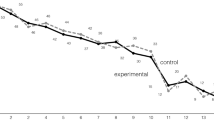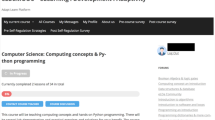Abstract
Learning in Massive Open Online Courses (MOOCs) requires learners to self-regulate their learning process or receive effective self-regulated learning (SRL) interventions to accomplish personal goals. Much attention has thus been paid to how SRL influences learner performance in MOOCs, but research has overlooked a person-centered analysis of how online learners perform SRL in this setting. Without understanding this individual difference, educators are unlikely to provide effective SRL interventions tailored to each type of self-regulated learner. In addition, it remains uncertain how culture shapes the differences in SRL traces, especially given that most of the existing understandings of SRL are rooted in Western cultures. To fill the gaps, this research applied learning analytics to explore learner profiles in terms of how they performed SRL in MOOCs. Using K-means clustering analysis, this research revealed four different self-regulated learner profiles: all-around SRL learners, disillusioned SRL learners, control-oriented SRL learners, and control-dominated SRL learners. In addition, all-around SRL learners outperformed the other three clusters in course grades. This research also identified cultural differences between those clusters. Practical implications on how to design effective SRL interventions are provided.



Similar content being viewed by others
Notes
Hostip.info—http://www.hostip.info/use.html.
References
Arslan, F., Bagchi, K., & Ryu, S. (2015, June). A Preliminary Evaluation of the determinants of certification success in MOOCs: A multi-level study. Paper presented at the Twenty-First Americas Conference on Information Systems. Retrieved from https://aisel.aisnet.org/amcis2015/ISEdu/GeneralPresentations/33/
Azevedo, R. (2005). Using hypermedia as a metacognitive tool for enhancing student learning? The role of self-regulated learning. Educational Psychologist, 40, 199–209.
Bakharia, A., Corrin, L., de Barba, P., Kennedy, G., Gašević, D., Mulder, R., et al. (2016, April). A conceptual framework linking learning design with learning analytics. In Proceedings of the sixth international conference on learning analytics & knowledge (pp. 329–338). ACM.
Bandura, A. (1986). Social foundations of thought and action: A social cognitive theory. Upper Saddle River, NJ: Prentice-Hall Inc.
Bandura, A. (1991). Social cognitive theory of self-regulation. Organizational Behavior and Human Decision Processes, 50(2), 248–287.
Bartolomé, A. R., & Steffens, K. (2015). Are MOOCs promising learning environments? Comunicar, 22, 91–99.
Bond, J. B., & Ellis, A. K. (2013). The effects of metacognitive reflective assessment on fifth and sixth graders’ mathematics achievement. School Science and Mathematics, 113(5), 227–234.
Chen, C., & Stevenson, H. W. (1995). Culture and academic achievement: Ethnic and cross-national differences. Advances in Motivation and Achievement, 9, 119–151.
Cicchinelli, A., Veas, E., Pardo, A., Pammer-Schindler, V., Fessl, A., Barreiros, C., & Lindstädt, S. (2018, March). Finding traces of self-regulated learning in activity streams. In Proceedings of the 8th international conference on learning analytics and knowledge (pp. 191–200). ACM.
Corrin, L., de Barba, P. G., & Bakharia, A. (2017, March). Using learning analytics to explore help-seeking learner profiles in MOOCs. In Proceedings of the seventh international learning analytics & knowledge conference (pp. 424–428). ACM.
Delfino, M., Dettori, G., & Persico, D. (2010). An online course fostering self-regulation of trainee teachers. Psicothema, 22(2), 299–305.
Di Mitri, D., Scheffel, M., Drachsler, H., Börner, D., Ternier, S., & Specht, M. (2017, March). Learning pulse: A machine learning approach for predicting performance in self-regulated learning using multimodal data. In Proceedings of the seventh international learning analytics & knowledge conference (pp. 188–197). ACM.
Fang, Z., Grant, L. W., Xu, X., Stronge, J. H., & Ward, T. J. (2013). An international comparison investigating the relationship between national culture and student achievement. Educational Assessment, Evaluation and Accountability, 25(3), 159–177.
Gašević, D., Kovanović, V., Joksimović, S., & Siemens, G. (2014). Where is research on massive open online courses headed? A data analysis of the MOOC research initiative. International Review of Research in Open and Distance Learning, 15(5), 134–176.
Genolini, C., & Falissard, B. (2010). KmL: k-means for longitudinal data. Computational Statistics, 25(2), 317–328.
Guo, Q., Liu, Z., Li, X., & Qiao, X. (2018). Indulgence and long term orientation influence prosocial behavior at national level. Frontiers in Psychology, 9, 1798. https://doi.org/10.3389/fpsyg.2018.01798.
Hofstede, G. (2011). Dimensionalizing cultures: The Hofstede model in context. Online Readings in Psychology and Culture. https://doi.org/10.9707/2307-0919.1014.
Hofstede, G. (1986). Cultural differences in teaching and learning. International Journal of Intercultural Relations, 10, 301–320. https://doi.org/10.1016/0147-1767(86)90015-5.
Hofstede, G., & Hofstede, G. J. (2005). Cultures and organisations: Software of the mind (2nd ed.). New York: McGrawHill.
Hofstede, G. & Hofstede, G. J. (n.d.). Dimensions of national cultures. Retrieved from, http://www.geerthofstede.nl/dimensions-of-national-cultures.
Hood, N., Littlejohn, A., & Milligan, C. (2015). Context counts: How learners’ contexts influence learning in a MOOC. Computers & Education, 91, 83–91.
Johnson, R. A., & Wichern, D. W. (2007). Applied multivariate statistical analysis. Upper Saddle River, NJ: Prentice Hall.
Kizilcec, R. F., & Schneider, E. (2015). Motivation as a lens to understand online learners: Toward data-driven design with the OLEI scale. ACM Transactions on Computer-Human Interaction (TOCHI), 22(2), 1–24.
Kizilcec, R. F., Pérez-Sanagustín, M., & Maldonado, J. J. (2017). Self-regulated learning strategies predict learner behavior and goal attainment in Massive Open Online Courses. Computers & Education, 104, 18–33.
Kizilcec, R. F., Piech, C., & Schneider, E. (2013). Deconstructing disengagement: Analyzing learner subpopulations in massive open online courses. Proceedings of the Third International Conference on Learning Analytics and Knowledge, LAK, 2013, 170–179.
Kramarski, B., & Michalsky, T. (2009). Three metacognitive approaches to training pre-service teachers in different learning phases of technological pedagogical content knowledge. Educational Research and Evaluation, 15(5), 465–485. https://doi.org/10.1080/13803610903444550.
Krzanowski, W. J., & Lai, Y. T. (1988). A criterion for determining the number of groups in a data set using sum-of-squares clustering. Biometrics, 44, 23–34.
Laursen, B., & Hoff, E. (2006). Person-centered and variable-centered approaches to longitudinal data. Merrill-Palmer Quarterly, 52(3), 377–389.
Littlejohn, A., Hood, N., Milligan, C., & Mustain, P. (2016). Learning in MOOCs: Motivations and self-regulated learning in MOOCs. The Internet and Higher Education, 29(1), 40–48.
Maldonado-Mahauad, J., Pérez-Sanagustín, M., Kizilcec, R. F., Morales, N., & Munoz-Gama, J. (2018). Mining theory-based patterns from Big data: Identifying self-regulated learning strategies in Massive Open Online Courses. Computers in Human Behavior, 80, 179–196.
McCardle, L., Webster, E. A., Haffey, A., & Hadwin, A. F. (2017). Examining students’ self-set goals for self-regulated learning: Goal properties and patterns. Studies in Higher Education, 42(11), 2153–2169.
McInerney, D. M., & King, R. B. (2018). Culture and self-regulation in educational contexts. In D. H. Schunk & J. A. Greene (Eds.), Handbook of self-regulation of learning and performance (pp. 485–502). Abingdon, UK: Routledge.
Milligan, C., & Littlejohn, A. (2016). How health professionals regulate their learning in massive open online courses. The Internet and Higher Education, 31, 113–121.
Patel, R., Tarrant, C., Bonas, S., Yates, J., & Sandars, J. (2015). The struggling student: A thematic analysis from the self-regulated learning perspective. Medical Education, 49(4), 417–426. https://doi.org/10.1111/medu.12651.
Popov, V., Biemans, H. J. A., Kuznetsov, A. N., & Mulder, M. (2014). Use of an interculturally enriched collaboration script in computer-supported collaborative learning in higher education. Technology, Pedagogy and Education, 23(3), 349–374. https://doi.org/10.1080/1475939X.2014.945474.
Purdie, N., & Hattie, J. (1996). Cultural differences in the use of strategies for self-regulated learning. American Educational Research Journal, 33(4), 845–871.
Roth, A., Ogrin, S., & Schmitz, B. (2016). Assessing self-regulated learning in higher education: A systematic literature review of self-report instruments. Educational Assessment, Evaluation and Accountability, 28(3), 225–250. https://doi.org/10.1007/s11092-015-9229-2.
Rothes, A., Lemos, M. S., & Gonçalves, T. (2017). Motivational profiles of adult learners. Adult Education Quarterly, 67(1), 3–29.
Sarle, W. S. (1983). Cubic clustering criterion. SAS Technical Report A-108. SAS Institution Inc., Cary, NC.
Schunk, D. H., & Ertmer, P. A. (2000). Self-regulation and academic learning: Self-efficacy enhancing interventions. In M. Boekaerts, P. R. Pintrich, & M. Zeidne (Eds.), Handbook of self-regulation (pp. 631–649). San Diego, CA: Academic Press.
Shi, Y., Frederiksen, C. H., & Muis, K. R. (2013). A cross-cultural study of self-regulated learning in a computer-supported collaborative learning environment. Learning and Instruction, 23, 52–59. https://doi.org/10.1016/j.learninstruc.2012.05.007.
Spector, J. M. (2014). Remarks on MOOCS and mini-MOOCS. Educational Technology Research and Development, 62(3), 385–392.
Srite, M., & Karahanna, E. (2006). The role of espoused national cultural values in technology acceptance. MIS Quarterly, 30, 679–704.
Tang, H., & Carr-Chellman, A. (2016). Massive Open Online Courses and educational equality in China: A qualitative inquiry. Journal of Educational Technology Development and Exchange, 9(1), 49–66.
Tang, H., & Wang, N. (2017). Have massive open online courses disrupted higher education around the globe? Exploring the cultural perspective. International Journal of Technology in Teaching and Learning, 13(1), 45–54.
Tang, H., Wang, S., Qian, Y., & Peck, K. (2016). Students’ perceptions of online instructors’ roles in a Massive Open Online Course. In S. D’Agustino (Ed.), Creating teacher immediacy in online learning environments (pp. 277–294). Hershey, PA: IGI Global.
Tang, H., Xing, W., & Pei, B. (2018). Exploring the temporal dimension of forum participation in MOOCs. Distance Education, 39(3), 353–372.
Tang, H., Xing, W., & Pei, B. (2019). Time really matters: Understanding the temporal dimension of online learning using educational data mining. Journal of Educational Computing Research, 57(5), 1326–1347.
Trommsdorff, G. (2012). Development of “agentic” regulation in cultural context: The role of self and world views. Child Development Perspective, 6, 19–26. https://doi.org/10.1111/j.1750-8606.2011.00224.x.
van den Boom, G., Paas, F., & van Merriënboer, J. J. G. (2007). Effects of elicited reflections combined with tutor or peer feedback on self-regulated learning and learning outcomes. Learning and Instruction, 17(5), 532–548. https://doi.org/10.1016/j.learninstruc.2007.09.003.
Wang, T. H. (2011). Developing web-based assessment strategies for facilitating junior high school students to perform self-regulated learning in an e-Learning environment. Computers & Education, 57(2), 1801–1812.
Weis, M., Trommsdorff, G., & Muñoz, L. (2016). Children’s self-regulation and school achievement in cultural contexts: The role of maternal restrictive control. Frontiers in Psychology, 7, 722.
Yoo, S. J., & Huang, W.-H.D. (2011). Comparison of Web 2.0 technology acceptance level based on cultural differences. Educational Technology & Society, 14(4), 241–252.
Zimmerman, B. J. (2000). Attaining self-regulation: A social cognitive perspective. In M. Boekaerts, P. R. Pintrich, & M. Zeidner (Eds.), Handbook of Self-regulation (pp. 13–39). San Diego, CA: Academic Press.
Zimmerman, B. J. (2002). Becoming a self-regulated learner. Theory into Practice, 41(2), 65–70. https://doi.org/10.1207/s15430421tip4102_2.
Author information
Authors and Affiliations
Corresponding author
Ethics declarations
Conflict of interest
The authors declare that they have no conflict of interests.
Additional information
Publisher's Note
Springer Nature remains neutral with regard to jurisdictional claims in published maps and institutional affiliations.
Appendix
Appendix
See Table 6.
Rights and permissions
About this article
Cite this article
Tang, H. Person-centered analysis of self-regulated learner profiles in MOOCs: a cultural perspective. Education Tech Research Dev 69, 1247–1269 (2021). https://doi.org/10.1007/s11423-021-09939-w
Accepted:
Published:
Issue Date:
DOI: https://doi.org/10.1007/s11423-021-09939-w




